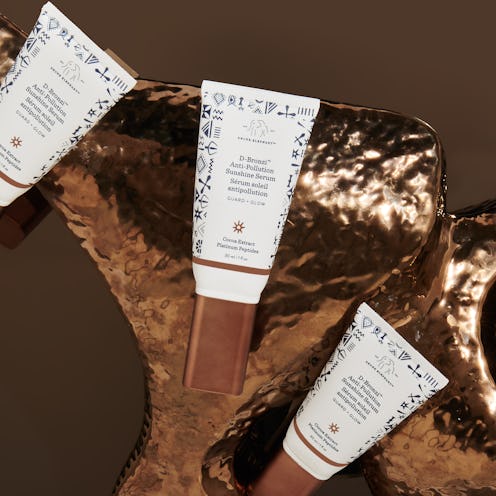(Beauty)
Anti-Pollution Beauty Products Are Everywhere, But Are They Legit?

You can’t round a corner in Sephora without seeing anti-pollution beauty products propped up on the shelves of the skincare section. They’re not just a passing trend: Pollution-fighting products are on track to become the new SPF — a daily protective skincare step you wouldn’t dream of skipping. But in order to fully dive into why and how to protect skin from pollution, it's important to first understand how it occurs.
“Pollution is comprised of harmful gases and particulate matter,” Dr. Joshua Zeichner of Zeichner Dermatology in New York City tells The Zoe Report. “These have been shown to promote free radical damage, leading to premature aging and the development of dark spots on the skin.” The key words here are free radical damage.
Free radicals are created when certain molecules — like the aforementioned gases and particulates, which are produced by everything from industrial emissions to plastics to UV light to cigarette smoke — interact with oxygen, nitrogen, or carbon. (And yes, all three of those elements are literally in the air you breathe, so free radicals are everywhere.) When free radicals come into contact with the skin, they can damage and even kill our skin cells; leading to wrinkles, age spots, and hyperpigmentation.
How Pollution Affects The Skin — And How You Can Protect It
“We see the effects of free radical damage on the skin through increased inflammation, accelerated aging, and a compromised protective barrier,” Dr. Loretta Ciraldo MD FAAD, a Miami-based dermatologist and co-founder of the Dr. Loretta skincare line, tells The Zoe Report. And that’s where the latest crop of anti-pollution beauty products comes in.
Antioxidants — the group of vitamins, minerals, and enzymes that fight free radicals — are the most accessible ingredients known to counter the effects of pollution on the skin. “Vitamins A, C, and E are the best studied of all the antioxidants,” Dr. Loretta says, citing these as key ingredients to look for in your skincare products. However, it’s important to note that antioxidants, like the name suggests, only protect from oxygen free radicals. Carbon free radicals and nitrogen free radicals are a little trickier to tackle, since there’s limited research in the field.
Lipochroman, a synthetic ingredient that’s inspired by vitamin E, is one of the only skincare ingredients out there that protects from all three types of free radicals (as well as from tiny dust particles that can accelerate the signs of aging). Algin, derived from marine algae, also defends against oxygen and nitrogen pollution by “absorbing and neutralizing nicotine, heavy metals, pesticides, and other pollution particles,” according to Dr. Loretta; while the ingredient aldenine — a combination of proteins and peptides — has been shown to protect from carbon free radicals.
For extra protection, Dr. Zeichner also suggests adding a mineral-based sunscreen to your daily routine, which, in addition to blocking UV light, also “forms a protective seal over the skin to physically block particulate matter from penetrating through the outer skin layer.”
Clearly, anti-pollution products — just like pollution itself — aren't just a fad. “We know that exposure to pollution can have significant impact on our skin,” Dr. Zeichner says. “The most important thing we can do is protect the skin as part of our daily routine.”
How To Minimize Your Pollution Contribution
While pollution is inevitable, everyone can do their part to minimize their personal contribution. The Department of Environmental Services suggests conserving energy by shutting off lights and electronics when you’re not using them, carpooling to work or using public transportation, and choosing environmentally-friendly dry cleaners. You can also invest in stainless steel straws and stop using plastic ones (Americans use half a billion plastic straws daily), support brands that use recycled materials and source their ingredients sustainably (like Love Beauty and Planet), and recycle all the packaging from your brand-new anti-pollution skincare products, of course.
Ahead, products that provide pollution protection during every step of your skincare routine — from cleansing to toning, moisturizing, and masking.